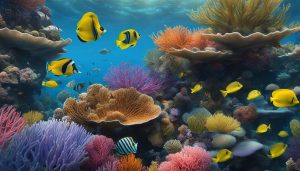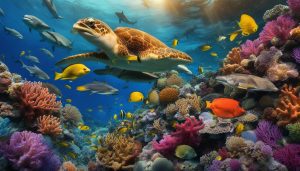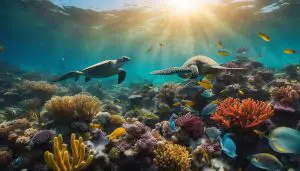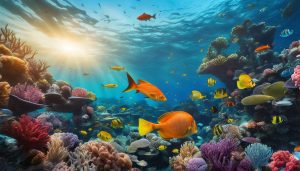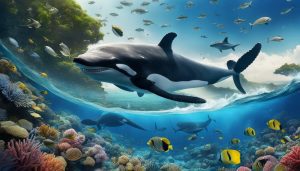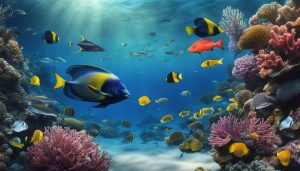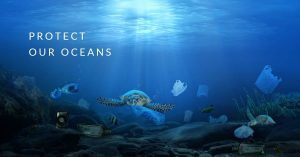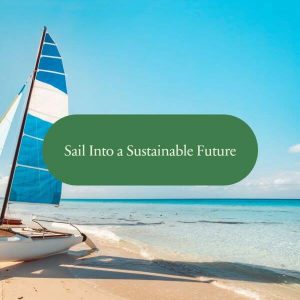Marine conservation is vital to preserve biodiversity, ecosystems, mitigate climate change, ensure food supplies, support coastal communities, and safeguard the planet's oxygen production.
Simply, it's crucial for the survival of marine life and humanity.
Table of Contents
- Introduction: Why Marine Conservation Matters More Than Ever
- Defining marine conservation
- Exploring the rich biodiversity of marine ecosystems
- What are the Threats to Marine Life?
- Importance of Healthy Oceans
- Why are sustainable fishing practices important?
- Marine Pollution and Plastic Waste
Introduction: Why Marine Conservation Matters More Than Ever
The ocean waves crash against the shore, seafoam swirling as the tide goes in and out. But beneath the surface, there's a hidden crisis threatening our aquatic friends. Marine conservation has never been more critical, and if we don't act now, we could lose the beauty and bounty of the big blue forever.
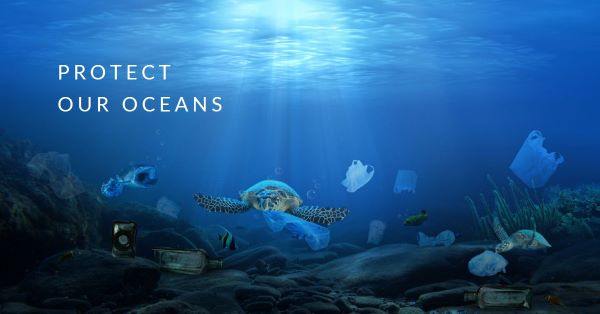
We humans have really done a number on our oceans. Through pollution, overfishing, and climate change, we've put immense strain on delicate ocean ecosystems. Just think about the poor sea turtles and dolphins choking on plastic bags or the corals bleaching from warming waters. It's enough to make your heart sink like a stone. If this keeps up, we're screwed bluer than a smurf in a blueberry pie!
Luckily, it's not too late to turn the tide. Marine protected areas, sustainable fishing policies, pollution controls - these can give sea life a fighting chance. And we owe it to poseidon, mother nature, and all those fin-tastic creatures below the waves to take action. As they say, no wat(t)er is too deep when it comes to protecting our oceans.
The time is now to make some waves in marine conservation. Whether it's reducing your plastic use, speaking up for endangered marine species, or supporting organizations like Oceana and the Nature Conservancy, every drop in the bucket counts to help this precious resource. Our ocean friends depend on us landlubbers to be their allies and advocates.
So next time you dig your toes in the sand or dip beneath the water’s surface, remember the hidden world waiting there. Join the rising tide to protect our oceans today - the fate of the seven seas hangs in the balance. With a splash of hope and as strong current of collective action, we can keep our oceans swimming for generations to come.
Defining marine conservation
Here is a brief explanation of my views on the significance of oceans and marine ecosystems.
Our big blue planet is aptly named, considering over 70% of Earth's surface is ocean. And let me tell you, these vast aquatic wonderlands are incredibly important for us landlubbers too! For starters, the oceans produce at least 50% of the planet's oxygen - vital for us breathers.
They also absorb a good chunk of human-caused carbon emissions, acting like a giant climate buffer. Not to mention oceans provide food, jobs, and recreations for gazillions of people.
The variety of life found in marine ecosystems from colorful corals to bizarre deep sea creatures is just downright mind-blowing! Clearly, the oceans aren't just swimming holes for fish. They make Earth habitable while wowing us with biodiversity.
So, for the sake of our climate, our economies, our oxygen supply, and our curiosity, we’ve got to protect these precious water worlds. The oceans uphold life as we know it - and we must return the favor before it's too late!
Exploring the rich biodiversity of marine ecosystems
If you think there's some bizarre beasts on land, just dive on down to see the alien aquaworld awaiting in the oceans' depths! From microscopic phytoplankton to giant whale sharks, it's life galore under the sea. Coral reefs alone house 25% of all marine species, making them the rainforests of the ocean. These kaleidoscopic ecosystems nurture over 4,000 types of funky fish alongside bizarre invertebrates. And the open ocean is teeming with migratory marlins, jellyfish drifiting like ghosts, and over 200,000 identified molluscs - not to mention the millions of mysterious microbes! Clearly planet Earth's most alien lifeforms lurk beneath the waves.
Yet these waters are way more than just a home for Nemo and friends. The oceans provide invaluable ecosystem services that us landlubbers depend on daily. They generate oxygen, absorb carbon, offer bountiful foods like fish and shellfish, and provide medicinal compounds.
The oceans also regulate climate, support economies through shipping and tourism, and provide spiritual and recreational enrichment. Plus, land and sea are interconnected - oceans absorb rainwater, nourish coastal lands, and transport heat worldwide.
So, while the oceans house bizarre critters, they also sustain humanity in countless ways. Our future is tied to the fate of sharks and phytoplankton alike - we're all aboard this watery Spaceship Earth!
What are the Threats to Marine Life?
Our finned and shelled friends are facing some major bad vibes, man. Pollution is harshing their undersea mellow in a major way. Hel-lo, trash island the size of Texas! Not to mention oil spills turning poor sea otters blacker than a goth teenager going through a phase. And the noise, my god the noise! Offshore drilling, sonar - it's stressin' out everything from whales to shrimp.
Overfishing ain't helping either, scooping up poor Nemo's relatives faster than a stoner eating free samples at the mall. Those nets miss nothing, depleting populations of breeding fish before they can even drop their funky larvae. Not groovy.
Even the seas themselves are getting hotter and more acidic, thanks to good ol' climate change. As oceans absorb our gnarly carbon emissions, coral reefs pay the price through disastrous bleaching events. By killing vibrant coral forests, these would wipe out entire underwater 'hoods. Not tubular at all!
And don't even get me started on seabed mining, invasive species, and plastic debris slowly choking adorable sea turtles. It's clear our oceans are getting slimier than the bathrooms at a biker bar. We gotta pump the brakes on polluting our big blue brethren before the damage becomes more shattering than a hardcore punk rock concert. Peace out and save the oceans, dudes!
Importance of Healthy Oceans
Our big blue mother (a.k.a the ocean) does so much for us landlubbers - can I get an amen?! Praise be the phytoplankton producing over half the oxygen we breathe! Bless the corals and mangroves protecting coastlines from storms! We bow down before the abundance of aquatic sustenance nourishing communities worldwide. And hallelujah the natural beauty providing serenity, adventure and major 'gram potential. Clearly, we'd be up the creek without a paddle if not for healthy oceans.
Yet like a bad houseguest, we've been abusing the Oceans for years. Our trash torments her creatures, our emissions heat her waters, and our noise stresses out her aquatic chill zones.
If we keep disrespecting the hand that feeds us, soon she may cease to bless us with her bounty. And then what? No oxygen to breathe, no fish to eat, no waves to surf - a truly awful existence indeed!
Plus, our ocean momma's generosity extends economic benefits too - marine tourism and fisheries contribute big bucks to coastal communities. So, for both moral and monetary reasons, we really should treat the Oceans better to safeguard our future. It's time to give back and care for the watery goddess who cares for us.
Why are sustainable fishing practices important?
The rules of sustainable fishing ain't too complex, do it right and we can fish forever, do it wrong and even the mighty oceans will run out of fish.
So a 10 year old knows we shouldn’t be overfishing. Simply limit hauls so fish populations don't dip too low. Target adult fish, give the little whippersnappers time to grow. And implement gear limits, closed seasons, even some no-fishing zones so schools can recover. It's also key to manage different species separately and respect food chain interconnections.
With climate change threatening fish, cutting those emissions wouldn’t hurt!
Just following simple guidelines like these, and communities can feast on seafood aplenty for generations. The fish will keep on swishin', so the people keep on dishin'!
So, let's build a bright blue future together, and create harmony between humans and our scaly, slimy, tentacled friends below the waves.
Marine Pollution and Plastic Waste
Our trash is spilling into the big blue faster than a popped fire hydrant in July! Wrappers, bottles, nets, you name it we are flushing it into our rivers and oceans.
Plastic's the real devil - takes 450 years to decay! So, waves keep breaking those pesky plastics into tiny bits, and critters keep mistaking them for food. Plastic is just making its wa into he food chain and that’s dangerous for mankind.
Now we can't expect our aquatic friends to avoid all our junk - it's on us to stop the spilling it into the ocean.
Without proper waste management and cutting plastic use pronto, microplastics will poison the ocean eventually.
Speak up for regulation reforms any chance you get, and join recycling programs to stop land waste from sinking the planet.
We should all think thrice before grabbing that bottled water or unnecessary plastic packaging off the supermarket shelves.
When sailing bring reusable goods, limit consumption, and properly dispose of plastics. Small drops can make mighty waves! With care and grit, we can calm the coming plastics storm before it's too late. Who's ready to get this plastic circus under control and lead our ocean back to clearer waters?
Read the latest Marine Conservation posts here:
- Understanding What Are Marine Conservation Areas: A GuideMarine conservation areas are protected ocean spaces designated to preserve marine environments and their inhabitants. These areas are established to help regulate human activities and promote sustainable practices that maintain the health and productivity of ocean ecosystems. Marine conservation areas play a crucial role in preserving marine biodiversity and protecting vulnerable species. By designating specific… Read more: Understanding What Are Marine Conservation Areas: A Guide
- Exploring Success Stories with Marine Conservation: Key InsightsIn recent years, marine conservation efforts have gained significant momentum, with organizations and individuals around the world taking action to restore the health of our oceans and protect marine life. In this article, we will delve into inspiring examples of marine conservation and showcase successful marine conservation projects through case studies and real-life stories. We… Read more: Exploring Success Stories with Marine Conservation: Key Insights
- Solutions Explored: What Can We Do About Marine ConservationOur oceans are essential for sustaining life on our planet, providing us with food, oxygen, and regulating our climate. However, our oceans face numerous threats such as overfishing, climate change, and pollution, which jeopardize the health and survival of marine life and the overall ecosystem. It's time we take action to protect our oceans and… Read more: Solutions Explored: What Can We Do About Marine Conservation
- Discover Who is the Father of Marine Conservation TodayEnvironmental preservation has become a pressing issue in recent times, with marine conservation at the forefront of efforts to protect our oceans and marine life. It is only through the tireless efforts of pioneers, trailblazers, and visionaries that we have come to understand the critical importance of preserving our planet's marine ecosystems. In this section,… Read more: Discover Who is the Father of Marine Conservation Today
- Understanding What Are Marine Conservation Zones: A GuideMarine ecosystems cover more than two-thirds of our planet and are an essential part of our lives. They provide us with food, oxygen, and countless other resources. However, human activities such as overfishing, pollution, and habitat destruction have put immense pressure on these ecosystems, threatening their health and sustainability. To address these issues, marine conservation… Read more: Understanding What Are Marine Conservation Zones: A Guide
- Understanding What is Marine Conservation: A Quick GuideMarine conservation refers to the protection and preservation of marine ecosystems and the species that inhabit them. It involves various efforts made by organizations and individuals to ensure the long-term sustainability of our valuable marine resources. Marine conservation strategies aim to reduce the negative impacts of human activities on marine ecosystems, such as overfishing, habitat… Read more: Understanding What is Marine Conservation: A Quick Guide
- Understanding What Are Marine Conservation Zones: A GuideMarine conservation is an important and growing field of work that aims to protect and preserve the health of our oceans and the species that inhabit them. With increasing awareness of environmental issues and the need for sustainable practices, the demand for professionals in the marine conservation sector is growing. If you are interested in… Read more: Understanding What Are Marine Conservation Zones: A Guide
- Why is Marine Conservation Important?Marine conservation is vital to preserve biodiversity, ecosystems, mitigate climate change, ensure food supplies, support coastal communities, and safeguard the planet's oxygen production. Simply, it's crucial for the survival of marine life and humanity. Introduction: Why Marine Conservation Matters More Than Ever The ocean waves crash against the shore, seafoam swirling as the tide goes… Read more: Why is Marine Conservation Important?
- Sustainable Sailing PracticesEver considered how your passion for sailing can harmonize with Mother Nature? Hop aboard as I chart a course through sustainable sailing – harnessing wind and sun, managing waste wisely, and respecting our aquatic neighbors. Discover why sailing green isn't just a trend, it's our future. Keep reading! Key Takeaways: Introduction Sustainable Sailing Practices: An… Read more: Sustainable Sailing Practices

